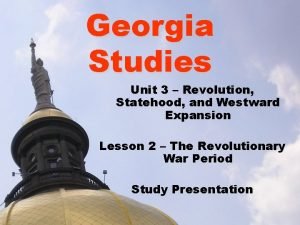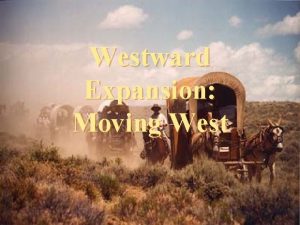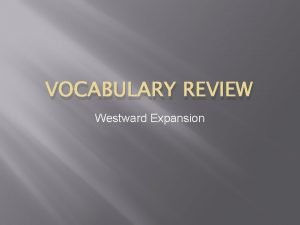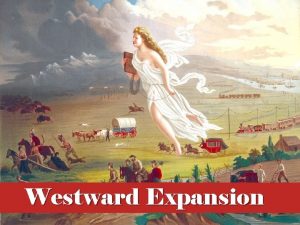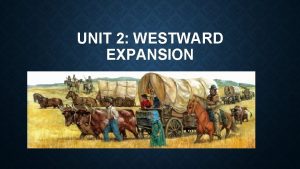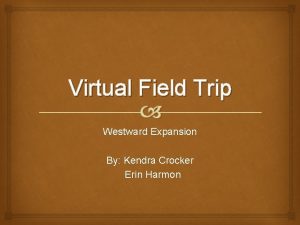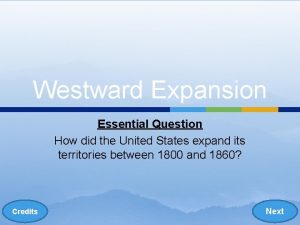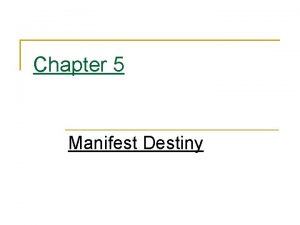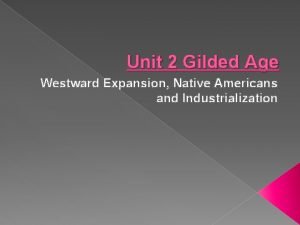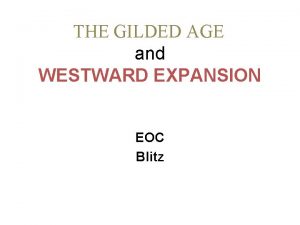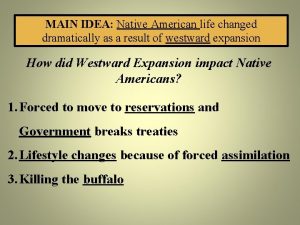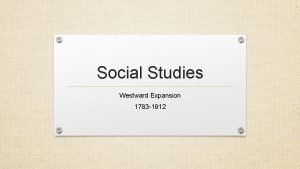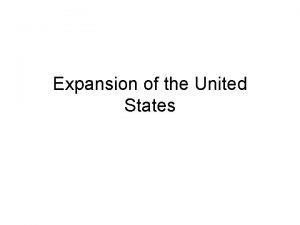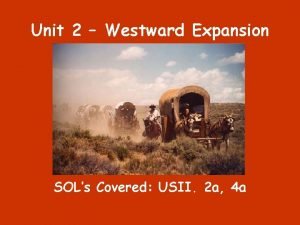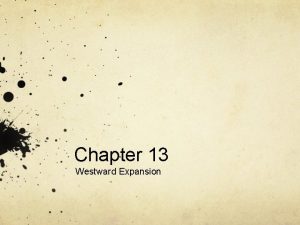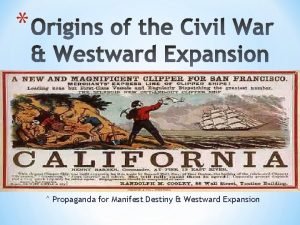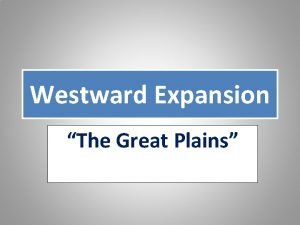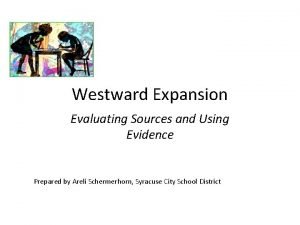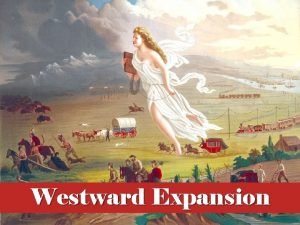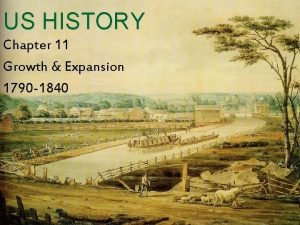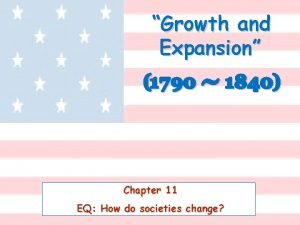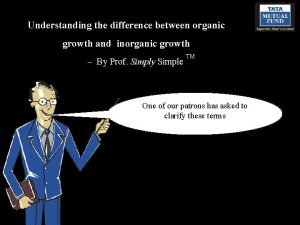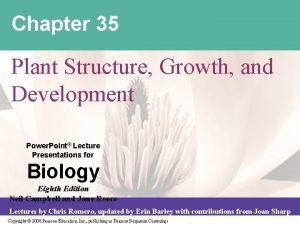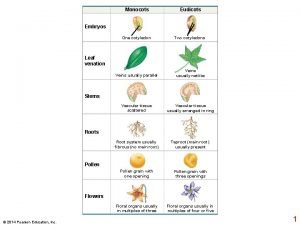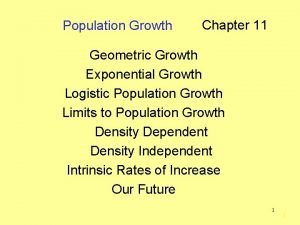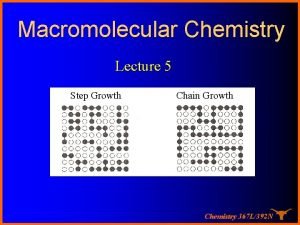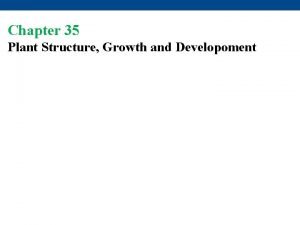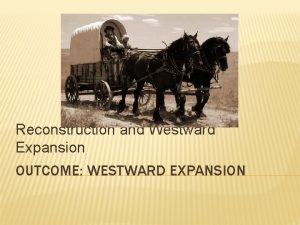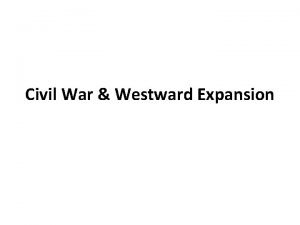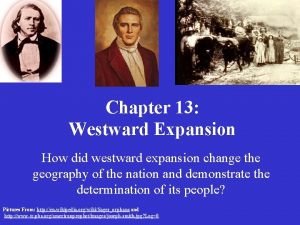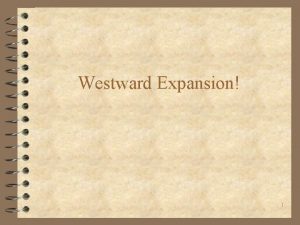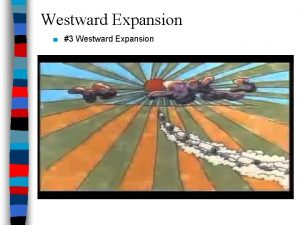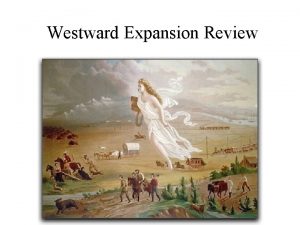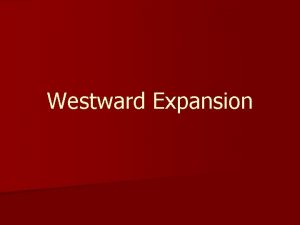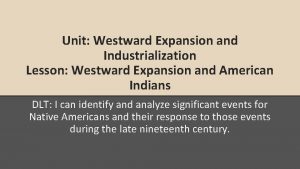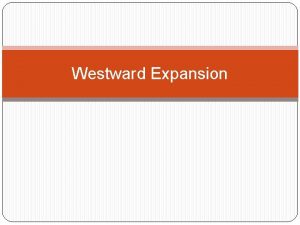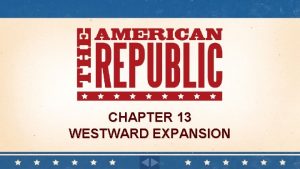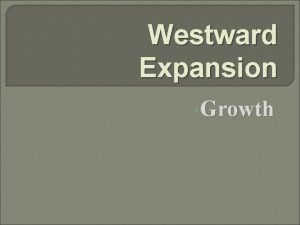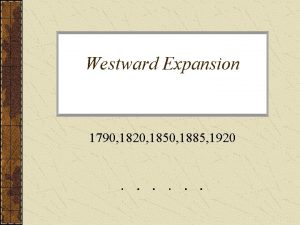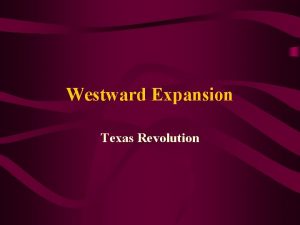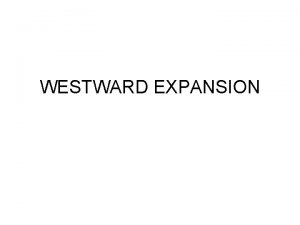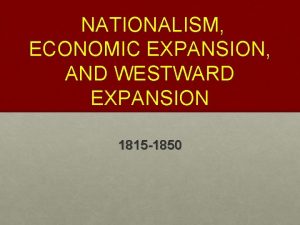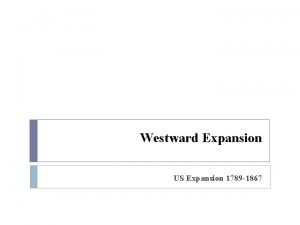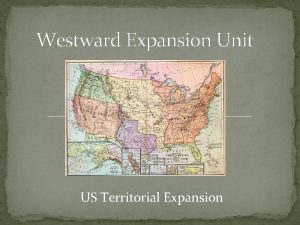Westward Expansion Westward Expansion Early Growth of the







































- Slides: 39

Westward Expansion

Westward Expansion

Early Growth of the United States In 1780, 2. 7 million people lived in the original 13 states By 1830, 12 million people lived in 24 states – The average family had five children !!


1790

What were the two most compelling reasons for Americans to go west?

A belief in the philosophy of Manifest Destiny, which stated that …. . A belief in the Frontier Theory, which stated that……

Manifest Destiny stated that …

“…. God, they said, clearly wanted hard–working American republicans to occupy North America. It was inevitable and good that the United States occupy the continent “from sea to shining sea. ” It demanded that Americans settle the whole of the continent with the principles of democracy and rooted in the word of God. ”

John L. O’Sullivan gave these ideas a name: Manifest Destiny. It is, he wrote, “our manifest destiny to overspread the continent allotted by Providence for the free development of our yearly multiplying millions…and for the development of the great experiment of liberty and federated self-government entrusted to us. ”

Summarize The belief or doctrine, held chiefly in the middle and latter part of the 19 th century, that it was obvious (manifest) and certain (destiny) of the U. S. to expand its territory over the whole of North America and to extend and enhance its political, social, and economic influences.

It justified expansion by emphasizing… the virtue of the American people and their institutions; the mission to spread these institutions, thereby redeeming and remaking the world in the image of the U. S. ; and the destiny under God to accomplish this work.





The Frontier Theory stated that … Frederick Jackson Turner Thesis stating that the on-going conquering of the frontier provided Americans a continual opportunity to re-assert their will, their perseverance, their pioneering spirit, their independence, their creative nature, their free-will, their strengths, and their domination.

What would happen to America, and the American spirit if the frontier were to close?

Why Go West? Besides “Manifest Destiny” and the “Frontier Theory”, what other reasons could people have had to go into the West?

Adventure Mining Gold and other precious metals Farming Natural Resources Land Ownership New Religious Opportunities Escape and Freedom Overpopulation in the East Coast New Business Opportunities Expanding freedom to new areas Spreading the American ethic of hard work and economic progress Pacific ports that could open Asian markets

Or maybe to find love ? ?

Were there any incentives for specific groups of people to travel west?

Incentives to go west included: The Pacific Railways Act – granted railroad company’s 10 square miles of land on either side of each track laid west

Beginning in 1863, the Union Pacific Railroad Company built west from Omaha, NE, while the Central Pacific Railroad Company built eastward from Sacramento, CA. The “transcontinental railroad” was completed on May 10, 1869, in a ceremony at Promontory Summit, UT.

Incentives to go west included: Morrill Act – land grants from states to educational facilities with curriculum tied to agriculture and mechanical arts – ie. University of Nebraska, Washington State, Clemson, Cornell

Incentives to go west included: Homestead Act – for approximately $10, settlers could have 160 acres of western land, if they met certain criteria: • American citizens who were 21 years or older, or the head of a household • Built a home on their lot, and lived in it at least 6 mos. of the year • Farmed the land for 5 years or more

Before long, many were imagining a North America without what they considered the savagery of Native Americans, the laziness and political instability of Mexicans, or the corrupt and dying monarchism of the British.

What were some of the issues preventing western expansion?

Financially Expensive Long Journey Uncharted Territory Fear of the Unknown Climate and Geography Native Americans Foreign Claims to the Land


If we wanted the land, how could we acquire it?

War Purchase Theft Trade Land Grants

Once we’ve decided to go west, how did we get there?

on steam powered boats along government and privately built roads on railroads as part of wagon trains horseback walking





 Westward expansion vocabulary
Westward expansion vocabulary Unit 3 rev. statehood and westward expansion
Unit 3 rev. statehood and westward expansion Westward expansion thesis statement
Westward expansion thesis statement Who made it
Who made it Westward expansion vocabulary words
Westward expansion vocabulary words Westward expansion essential questions
Westward expansion essential questions Unit 2 westward expansion vocabulary
Unit 2 westward expansion vocabulary Westward expansion virtual field trip
Westward expansion virtual field trip Westward expansion clipart
Westward expansion clipart Westward expansion wagon
Westward expansion wagon Westward expansion acrostic poem
Westward expansion acrostic poem Gained voter support by helping immigrants find jobs.
Gained voter support by helping immigrants find jobs. Assimilation westward expansion
Assimilation westward expansion Us territorial acquisitions map
Us territorial acquisitions map American historama lewis and clark
American historama lewis and clark Westward expansion territories map
Westward expansion territories map Westward expansion lewis and clark
Westward expansion lewis and clark Unit 2 westward expansion vocabulary
Unit 2 westward expansion vocabulary Chapter 13 westward expansion
Chapter 13 westward expansion Westward expansion propaganda
Westward expansion propaganda Great plains westward expansion
Great plains westward expansion Jimmy fallon gadsden purchase
Jimmy fallon gadsden purchase Westward expansion
Westward expansion How did the hudson river school increase westward expansion
How did the hudson river school increase westward expansion Chapter 11 growth and expansion
Chapter 11 growth and expansion Chapter 11 growth and expansion vocabulary
Chapter 11 growth and expansion vocabulary Early cpr and early defibrillation can: *
Early cpr and early defibrillation can: * Difference between organic and inorganic growth
Difference between organic and inorganic growth Chapter 35 plant structure growth and development
Chapter 35 plant structure growth and development Eudicot
Eudicot Geometric growth vs exponential growth
Geometric growth vs exponential growth Step growth polymerization vs chain growth
Step growth polymerization vs chain growth Neoclassical growth theory vs. endogenous growth theory
Neoclassical growth theory vs. endogenous growth theory Primary growth and secondary growth in plants
Primary growth and secondary growth in plants Plant growth index
Plant growth index Từ ngữ thể hiện lòng nhân hậu
Từ ngữ thể hiện lòng nhân hậu Hươu thường đẻ mỗi lứa mấy con
Hươu thường đẻ mỗi lứa mấy con Diễn thế sinh thái là
Diễn thế sinh thái là Vẽ hình chiếu vuông góc của vật thể sau
Vẽ hình chiếu vuông góc của vật thể sau Phép trừ bù
Phép trừ bù

